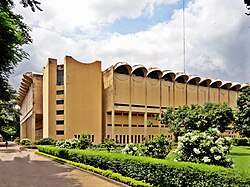Bangladesh National Museum
বাংলাদেশ জাতীয় জাদুঘর | |
 | |
 | |
Former name | Dacca Museum |
|---|---|
| Established | 20 March 1913 |
| Location | Shahbag, Dhaka, Bangladesh |
| Coordinates | 23°44.25′N 90°23.67′E / 23.73750°N 90.39450°E |
| Visitors | c. 15 million (including c. 1.2 million foreigners) per year |
| Director | Md. Kamruzzaman[1] |
| Website | bangladeshmuseum |
The Bangladesh National Museum (Template:Lang-bn), is the national museum of Bangladesh.[2] The museum is well organized and displays have been housed chronologically in several departments like department of ethnography and decorative art, department of history and classical art, department of natural history, and department of contemporary and world civilization. The museum also has a rich conservation laboratory. Nalini Kanta Bhattasali served as the first curator of the museum during 1914–1947.[3]

History

Bangladesh National Museum was originally established on 20 March 1913, albeit under another name (Dacca Museum), and formally inaugurated on 7 August 1913 by The Lord Carmichael, the governor of Bengal. In July 1915 it was handed over to the Naib Nazim of Dhaka.[4] Bangladesh National Museum was formed through the incorporation of Dhaka museum and it was made the national museum of Bangladesh on 17 November 1983. It is located at Shahbag, Dhaka.[5][4] It has several publications from 1978, first was "Islamic Art in Bangladesh, Catalogue".[6]
Visitors
On an average more than 2000 visitors come to visit the Bangladesh National Museum every day. Foreigners are also among them. Visitor fee is Tk 40 for adults and Tk 20 for minors. 500 for foreigners and 300 for visitors from SAARC countries.[7] However, tickets are not required for children below 03 years of age and physically challenged persons.
Structure
The categories of artifacts of the National Museum are:
- History and Classical Art
- Ethnology and Decorative Arts
- Contemporary Art and World Civilization
- Department of Natural History
- Conservation Laboratory
There is also a public education department.
Management structure
Bangladesh National Museum is an autonomous institution established by law and controlled by a board of trustees. However, a director general appointed by the government holds the overall responsibility as the chief executive of the museum. There are currently 330 officers and employees working in the Bangladesh National Museum.
Ground floor
The ground floor consists of some old guns at the entrance and the hall where the people book their tickets or assemble to hear the history of the museum. The hall leads to a grand staircase. Beside the hall, there is a smaller room which also acts like the hall (it is also used by the guides to tell the visitors about the history) and a simple staircase.
First floor
The first floor is divided into 22 rooms.
First room
The first room displays a large map showing the map of Bangladesh and its 64 districts.
Second room
The second room consists of a large statue of a royal Bengal tiger.
Third-tenth rooms
These rooms consist of natural beauties found in Bangladesh. In one of the room there is showcase of a tongue of a whale.
Tenth-22nd rooms
The other rooms contain some historic relics of Bengal up to 1900. There is a room which shows the different boats used by the rural people.
Second floor
The second floor consists of photos of famous people and showcases the Bangladesh Liberation War and the Language Movement of 1952. There are posters used in the war, a torture machine and much more. There are also two libraries.
Third floor
The third floor consists of pictures of international politicians, artists, scientists, famous pictures and four international galleries – Chinese, Korean, Iranian and Swiss.[8]
Gallery
-
Composition,
Novera Ahmed -
Reclining Figure,
Novera Ahmed -
Seated Woman,
Novera Ahmed -
View from the right-front
References
- ^ Administrator, Super. "Director General". bangladeshmuseum.gov.bd. Retrieved 24 December 2022.
- ^ "[WATCH NOW] Novera's exhibition begins at National Museum". The Daily Star. 8 October 2015. Retrieved 19 December 2017.
- ^ "Nalini Kanta Bhattasali's 67th death anniversary observed". The Daily Star. 28 February 2014. Archived from the original on 12 August 2017. Retrieved 12 August 2017.
- ^ a b "Eventful Innings". The Daily Star. 7 August 2013. Retrieved 19 December 2017.
- ^ "Welcome to Bangladesh National Museum". bangladeshmuseum.gov.bd. Archived from the original on 28 October 2017. Retrieved 19 December 2017.
- ^ "Publications". bnm.org.bd. Retrieved 12 August 2023.
- ^ "Entry Fee".
- ^ "Gallery Floor Plan". Archived from the original on 30 August 2014. Retrieved 9 September 2014.












